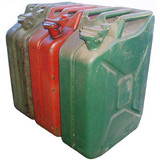Safe Storage of Fuel at Home

SAFE STORAGE OF FUEL AT HOME
Many people will have garden equipment, generators, machines or tools that use petrol or diesel in their garages or sheds - but is the fuel stored safely, securely and legally?
Fuel and fuel vapour are highly flammable, explosive and toxic, so incorrect storage and handling can have fatal consequences.
WHAT'S THE LIMIT?
HSE official guidelines state that you can legally store a combined limit of up to 30 litres of petrol or diesel fuel at a domestic residence or non-workplace premises in the UK.
Fuel has to be stored in clearly marked, suitable metal or plastic containers or one demountable fuel tank or a combination of either, so long as no more that 30 litres is kept.
The containers must have been manufactured specifically for the storage of fuels as they can protect against impact damage, naturally occurring UV radiation and won’t degrade due to exposure to fuels.
WHAT CONTAINERS CAN I USE TO STORE PETROL?
Legislation allows you to store petrol in the following containers:
- Plastic containers storing up to 10 litres.
- Metal containers storing up to 20 litres.
- Demountable fuel tank storing up to 30 litres.

DO THE LIMITS INCLUDE WHAT’S ALREADY IN MY CAR?
No, the petrol in the fuel tank of your car, boat (with internal fuel tank) or aircraft does not count when you are calculating the total amount you are storing.
If you have any additional fuel containers in the boot of your vehicle, this will count towards the total.
CORRECT STORING & SAFETY
Consideration as to where you’re going to store fuel is also of paramount importance.
Fuel should never be stored in your home or any living space.
Fuel should be stored in a well ventilated, secure outbuilding as far away from any possible sources of ignition (e.g. electrical equipment, heaters, etc.) and kept away from any other combustible material.
Fuel should always be stored in containers specifically designed for fuel storage. They will have been designed so they are reasonably robust and not liable to break under normal conditions of use. They also help prevent the escape of liquid or vapour and ensure fuel can be safely poured from them.
Fuel containers should not be filled to capacity. Only ever fill to 85% to allow for expansion of the fuel.
Do not smoke or use around naked flames when using fuel.
Always refill equipment outside in well ventilated areas.
Do not fill the tank of any appliance when the engine is hot. Fuel spilled on a hot engine can spontaneously ignite.
Never pour fuel into drains or water courses - it is a criminal offence to do so.
ARE THERE ANY OTHER FACTORS I SHOULD CONSIDER?
Firstly, do you really need to keep a quantity of fuel in your shed or garage?
Unleaded petrol can go stale in as little as 1 month, so by storing large quantities just for a mower, for example, may actually cost you money in the long run, as stale fuel will have detrimental effects to the running of your equipment.
If the fuel is stored in a garage or building attached to your home, are the fire resistance requirements suitable? Older properties may only need garages to be constructed of ‘material not readily flammable’, whereas newer properties would need to be constructed of ‘fire-resistant internal linings’. Failure to ignore this could have catastrophic results and also invalidate your home or building insurance.
WHAT IF I NEED TO STORE MORE THAN 30 LITRES?
If you need to keep over 30 litres of fuel, you will need to contact your local Petroleum Enforcement Authority (PEA) and follow the legal requirements that apply to your situation.

